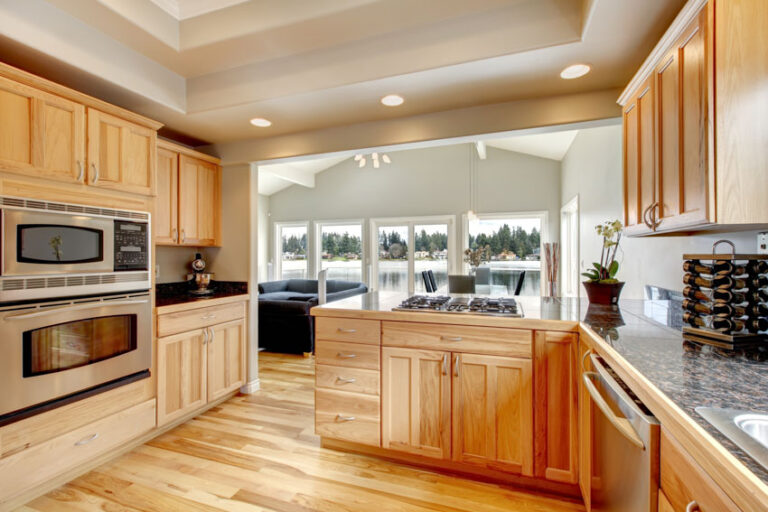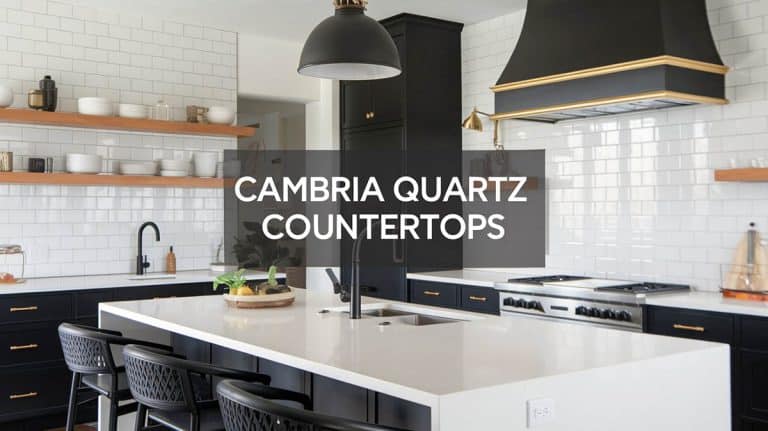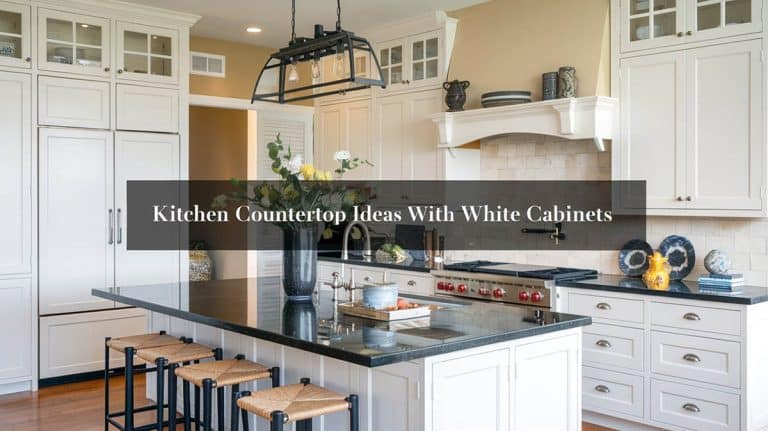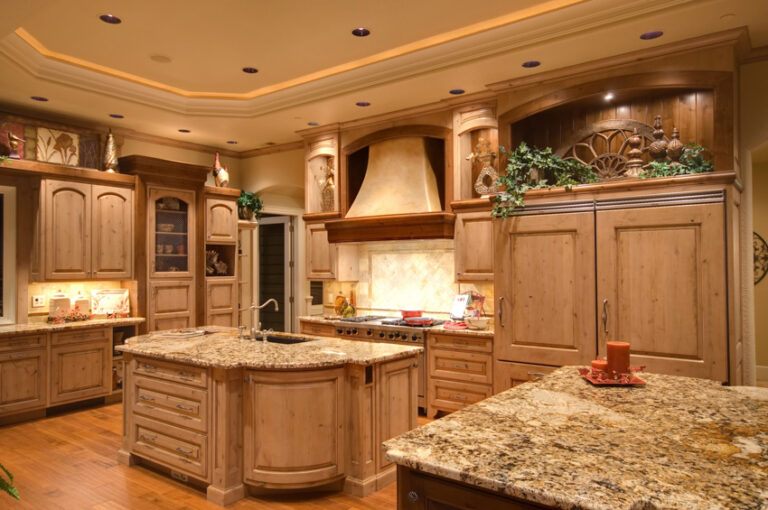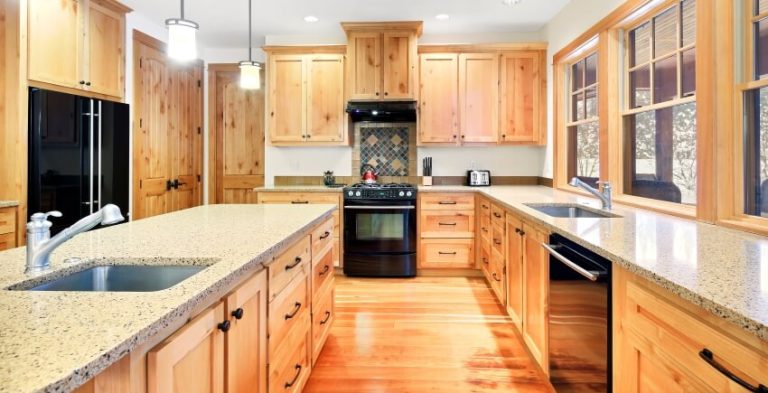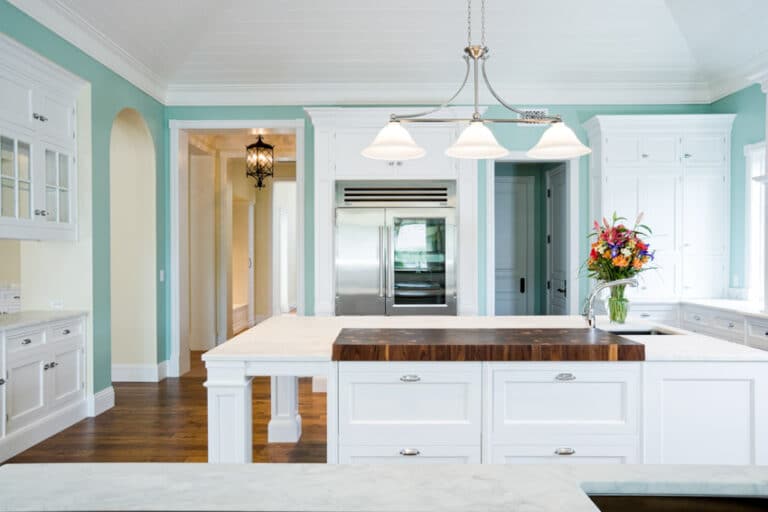Curved Kitchen Cabinets (Pros & Cons and Designs)
Curved kitchen cabinets have become increasingly popular in recent years. A curved cabinet is indeed a fashionable, functional, and ergonomic option for family homes. Furthermore, it overcomes the risks that sharp edges can cause to children, and it is great for small, awkward locations where bulging corners might impede mobility. Curved units’ smooth contours will free up the space and generate the illusion of openness.
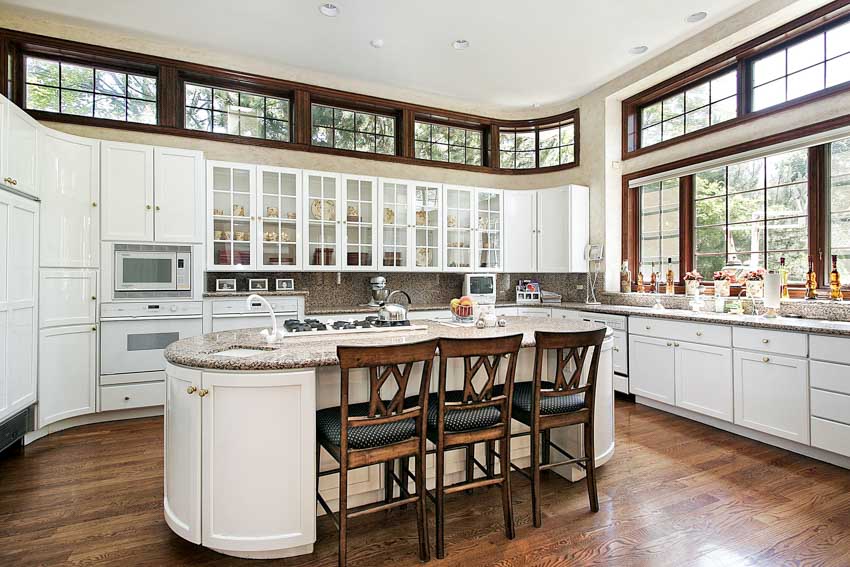
In this article, we will cover all of the essential information about curved kitchen cabinets, including their various types as well as pros and cons.
What Are Curved Cabinets in the Kitchen?
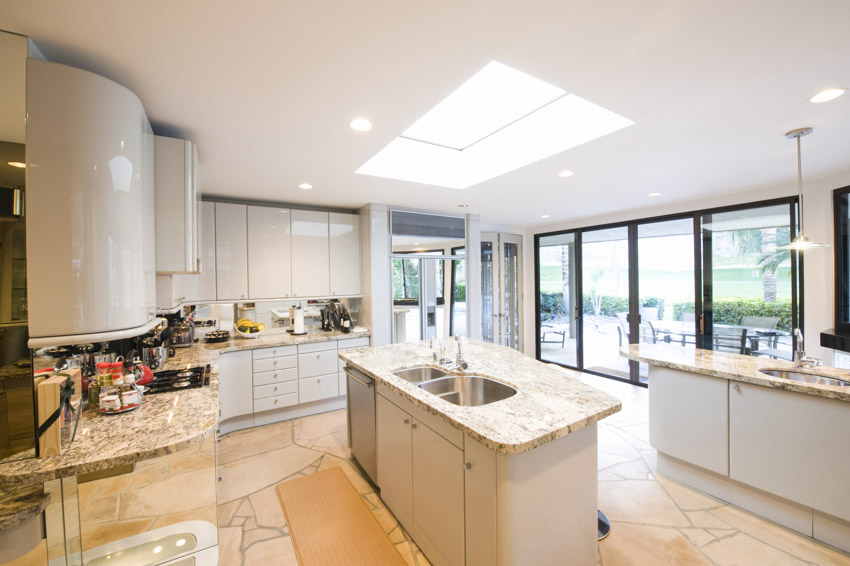
Curved cabinets for kitchens are intended to create a comfortable environment. It has no sharp edges and a lovely flow that draws the eye. This style is elegant, functional, and ergonomically designed, making it ideal for a family setting.
The cabinet joints on curvilinear cabinetry are perpendicular to the radius of the curve. Young ones are safe because there are no jagged hard edges, and tiny, awkward places are flawlessly occupied. Truly, the soft lines that rounded storage spaces provide open up the cooking space.
Moreover, this type of architecture is already becoming extremely prevalent since it is ideally suited to open-concept kitchen areas and can be a beautiful focal piece on central islands. The gentle appearance complements the other areas and invites family members to spend time together.
Curvilinear cabinetry is rather novel as they were formerly reserved for modern homes, but with many classic residences transitioning to more modern styles, curves are enhancing them in the most delightful way.
Pros and Cons of Curved Cabinets
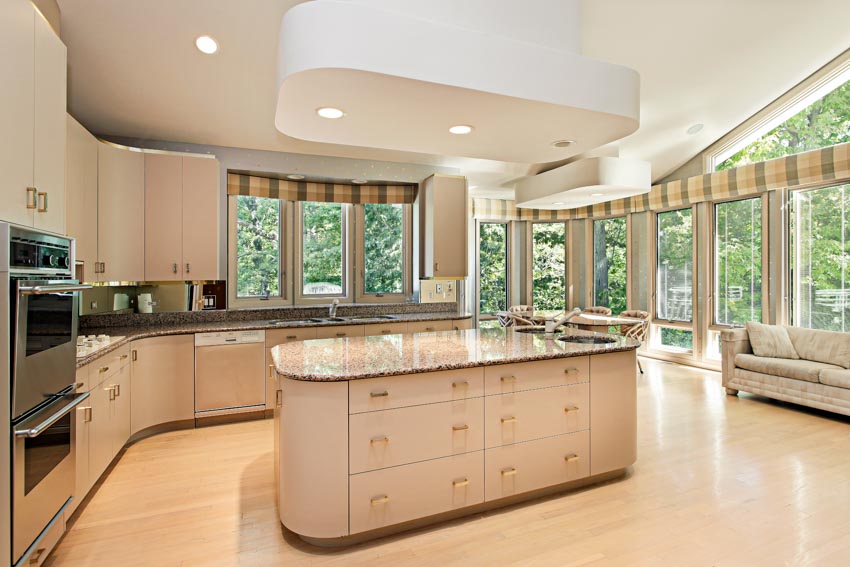
Advantages of Curved Cabinetry
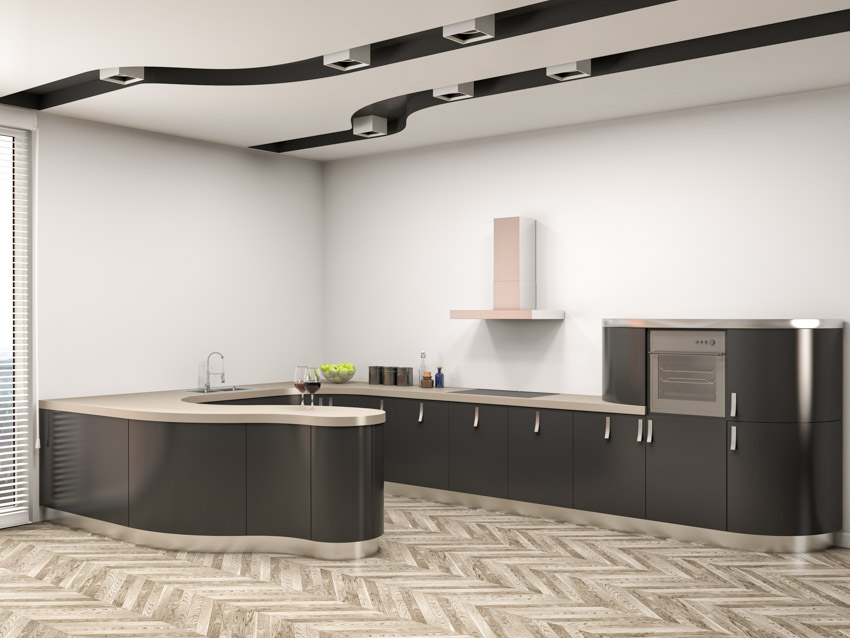
Practical and Aesthetically Appealing Design: When it pertains to being curvy, kitchens may be any size. Natural shapes play a key role, accentuated by a well-balanced mix of proper angles and semi-circles.
You can significantly soften the feel and look of your kitchen space with a gentle sweep between corners that leads you to the movement of open space and minimalist design. Rounded storage cabinetry is easier to maintain and safer to use, with no sharp corners or abrupt ends that detract from the sophistication of a well-planned core hub.
Incorporating a curved feature balances sleek natural lines with classical form, whether your island is the major curved component in your design layout or your top cabinet makes a smooth trip around the kitchen space.
Helps Add a Modern and Eye-Catching Interior Design: Curved islands are a significant aspect and add a truly genuine element to the kitchen; in its most basic form, the island can be rectangular with rounded sides to tone down the entire look, or it can be completely round. The most remarkable islands are semicircular in shape, with a hob in the center and a preparation area on either side.
Widely Available: Curves in the kitchen are a pretty modern occurrence that was formerly reserved for modern interiors, and there is currently a broad range of options accessible to accompany antique properties, spanning from comfortable countryside styles to large neoclassical designs. Built-in and freestanding curved kitchen cabinet models are now commonly available as well.
More Inconspicuous Kitchen Storage: One of the best aspects of curved cabinets is that there will be more inconspicuous storage spots for all of your kitchen equipment. Elegance is found in the adaptable elements, which are concealed under the smooth curves of easy-to-access storage solutions.
These types of cabinetry are friendlier to those who normally bump into them than the harsh and tough corner cabinets that must be stored away, with a radius that provides more space for your cookware. You can experience all of the perks of any other cabinet, like built-in storage and pantry pull-outs, even in the most oddly shaped of spaces.
Looks Outstanding in Natural Colors: Curvilinear cabinetry looks more natural, sliding over bends and rounds with undetectable elegance and simplicity. When it refers to equipping these naturalistic designs, it stands to reason for natural types of kitchen cabinet materials and earth-inspired hues.
Rich woods, weathered concrete, deep timbers, polished marble, and smooth chrome help make curved cabinetry sparkle the brightest. You can allow nature to speak for itself and bring peace into your daily existence around your space.
Fits in Tight Spaces: Curvilinear cabinetry works effectively in tight spaces as well. Its modest sweeping and organic curves help you maximize your cooking space, merging your design components with convenient storage and delicate architecture for well-designed and spacious privacy.
Disadvantages of Curved Design Cabinets
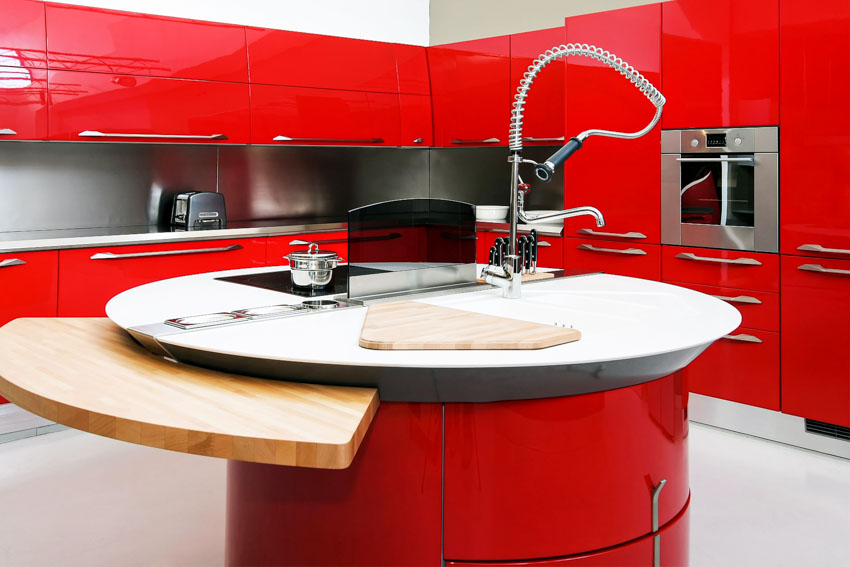
Expensive: These storage spaces are usually more pricey than regular units due to the additional expertise required in their production. However, they can be included more discreetly and at a lower expense.
Some examples include at the end of a built-in run, a corner cabinet, or, if conditions allow, a central island, which combines nicely with clean edges elsewhere in the kitchen.
Accessories are Slightly Demanding: Curved cabinetry front furnishings must be smooth — you have to consider installing round handles, curved bar or cup knobs, or doors with built-in handle grooves.
The types of kitchen countertops you’re using at home will have to be custom-cut, typically in solid wood, granite, or a composite, and ensure to incorporate curves in other components, such as sinks, to complete the design.
Types of Curved Kitchen Cabinets
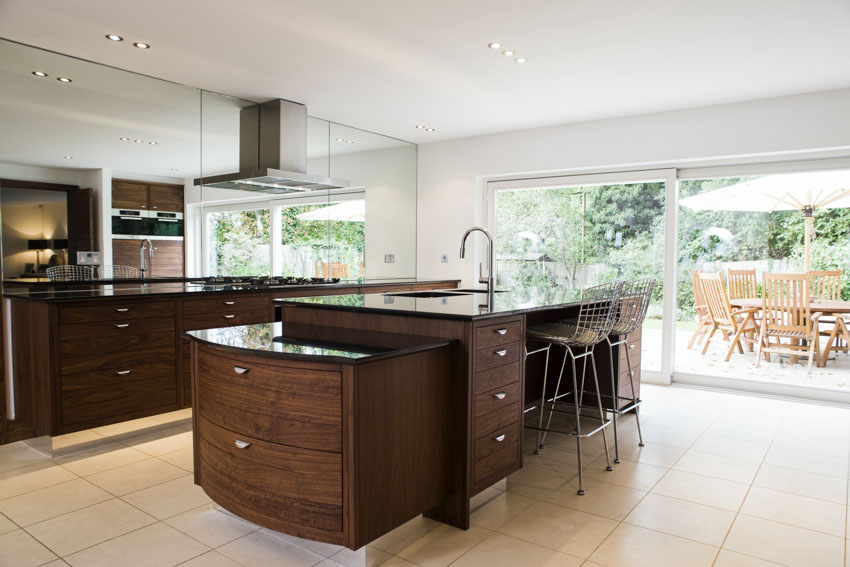
Here, we share some of the different curved cabinetry types.
Rounded Cabinets
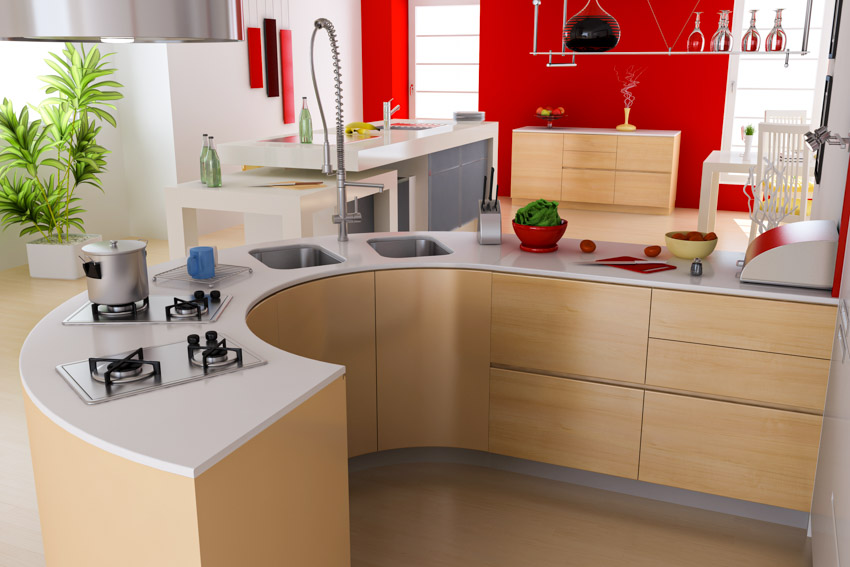
Beautifully rounded cabinets, which are commonly found in high-end cabinetry designs, are an excellent choice for homes with pets or small children since they reduce harsh corners at the end of a row of drawers.
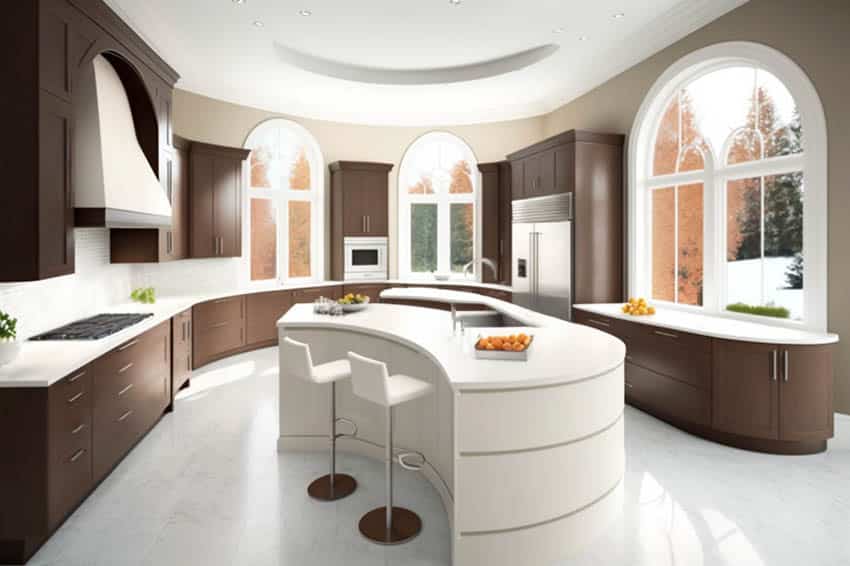
Curvilinear cabinetry with a rounded form creates a sleek and seamless flow all over a room while adding significant storage space for organizing items.
Cabinets With Curved Doors
Cabinets with rounded fronts have a contoured form and a smooth edge, providing a premium appeal in any theme and adding a luxurious touch to your modern kitchen space.
Round-edged cabinetry doors, which are commonly utilized at the end of a row of cupboards, can also be used to complete an island for a striking effect.
Curvilinear cabinet doors are also an excellent feature for youngsters or pets since they help avoid accidents caused by knocks and bumps. With a number of sizes available when purchasing cabinets with rounded doors, it can be simple to produce a customized effect in any design.
Curved Corner Cabinets
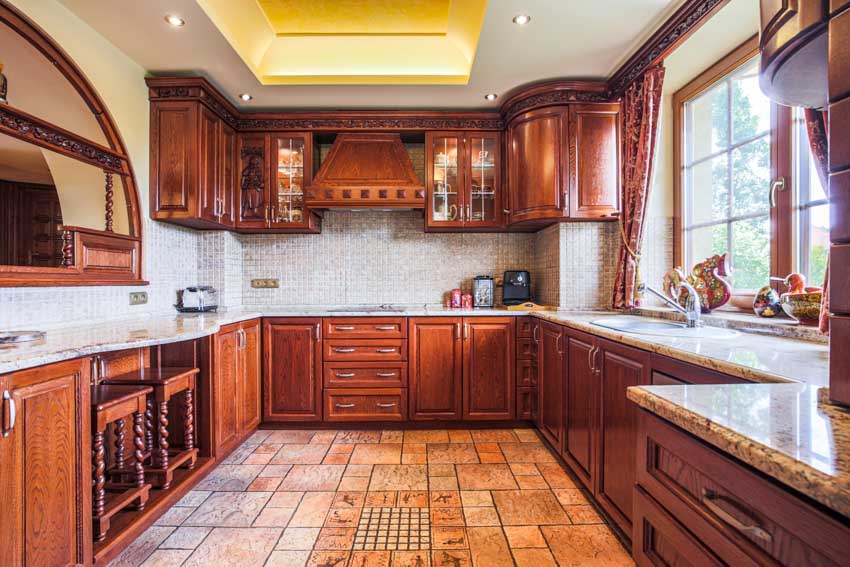
If an angled cabinet does not suit the aesthetic of your kitchen, there are alternative options. Consider installing a round-cornered cabinet in your kitchen. It is an excellent choice if you want to boost the style of your cooking area design. It appears more customized and functional than the typical angled corner cabinet.
When exploring cabinet design and corner cabinets, you will most likely come across the words “blind corner cabinet.” A blind corner is the space formed when two perpendicular cabinet lines intersect.
In most circumstances, installing a “blind corner cabinet,” which stretches beyond the corner and occupies the space available, is a better utilization of restricted storage space.
Curved Cabinetry Kitchen Island
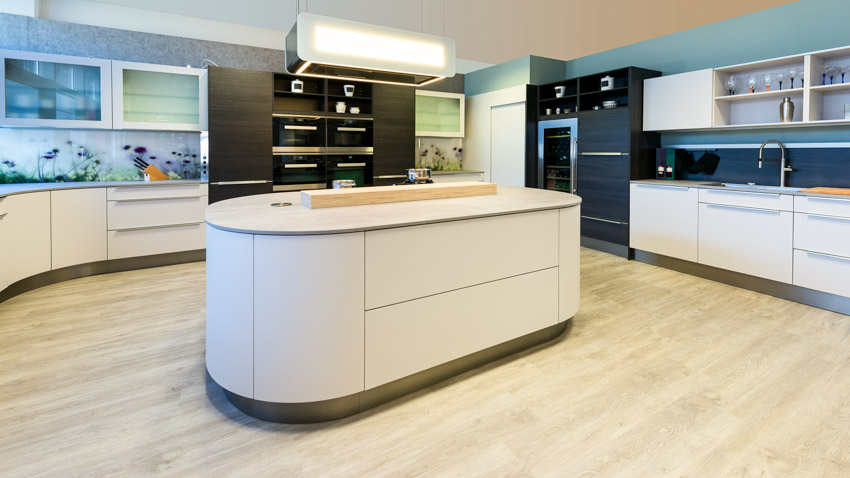
You can easily incorporate a rounded-edged cabinet into your central island. Modern kitchen islands with curving cabinets will provide a great visual impact like no other piece in the space if you have enough space.
Rounded cabinets on a central island will not create uncomfortable angles for household members to travel around or corners for them to become stuck in. However, while visually appealing, curvilinear cabinets typically have less storage space than square-shaped cabinets.
Are Curve-Design Kitchens More Expensive?
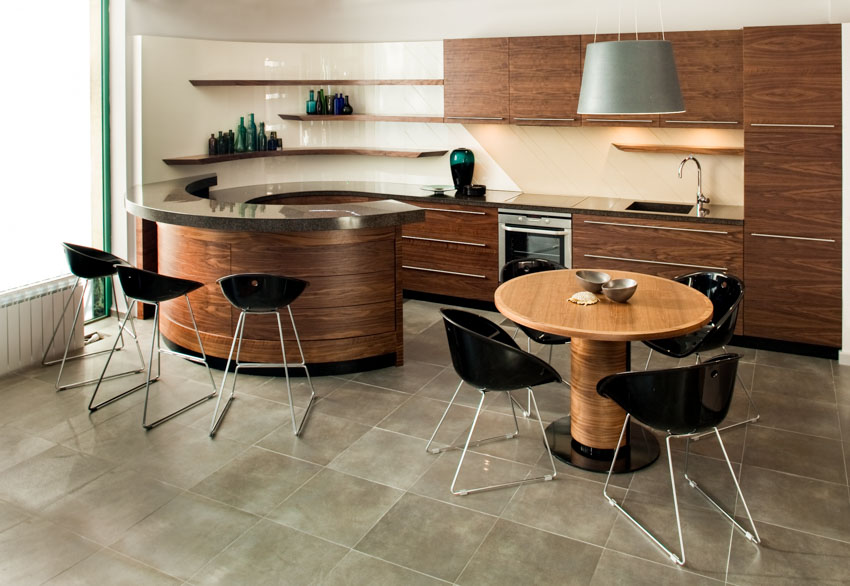
Normally, yes. Because of the additional craftsmanship required, round-shaped kitchens can be slightly more expensive than regular versions. However, if they are positioned at the end of the central range or on an island, they can be more discreetly added at a reduced cost.
What Kitchen Styles Have Curved Cabinets?
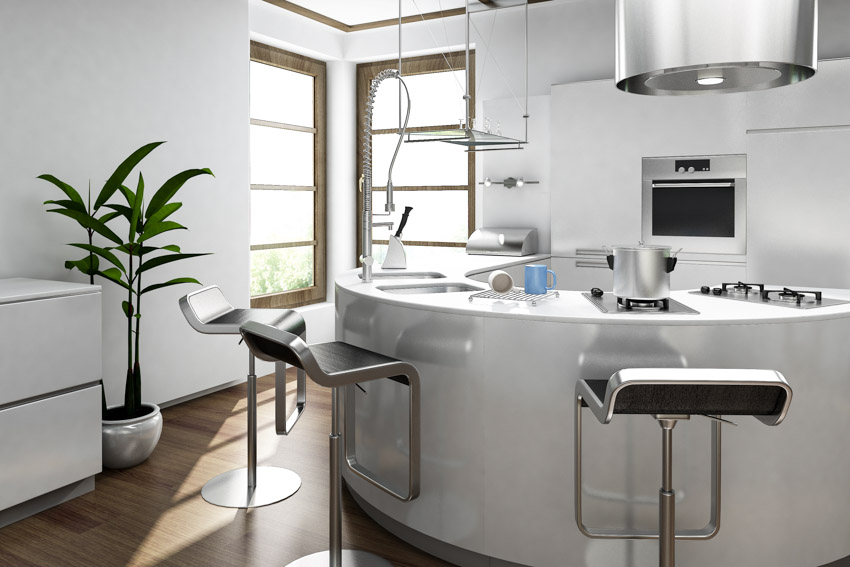
Traditional Style Kitchens: A traditional cooking space is distinguished by its clean, warm, and inviting style, which includes lovely yet minimalistic curving cabinets. It uses classic design components and a wealth of natural colors to create an aesthetically ageless appeal.
Contemporary Style Kitchens: The contemporary style is a trendy design element that homeowners have widely adopted. A contemporary style combines new and old, relaxed yet polished materials to create a sleek design. This would be a perfect match since curvilinear cabinetry is mainly designed for modern and contemporary-style kitchens.
Transitional Style Kitchens: Transitional kitchens provide the perfect combination by merging classic and contemporary design principles. The transitional style kitchens are defined by their combination of historical and modern design elements. As aforementioned, curvilinear cabinetry complements both classic and modern kitchens, hence this would be a perfect match.
Transitional kitchens combine the warm comfort of a classic kitchen with the attractively pristine and minimalistic curving storage units prevalent in contemporary styles.
Countryside/Beach Style Kitchens: Beach-themed kitchens provide a coastal atmosphere right in your house. Cool blues are combined with stylistically suitable accessories like seagrass, wicker, and sand to create a soothing, motivating, and entertaining vacation-themed setting. Since curvilinear cabinetry normally have natural colors, they are often seen in beach or country-style kitchens as well.
See more related content in our article about lacquer kitchen cabinets on this page.

